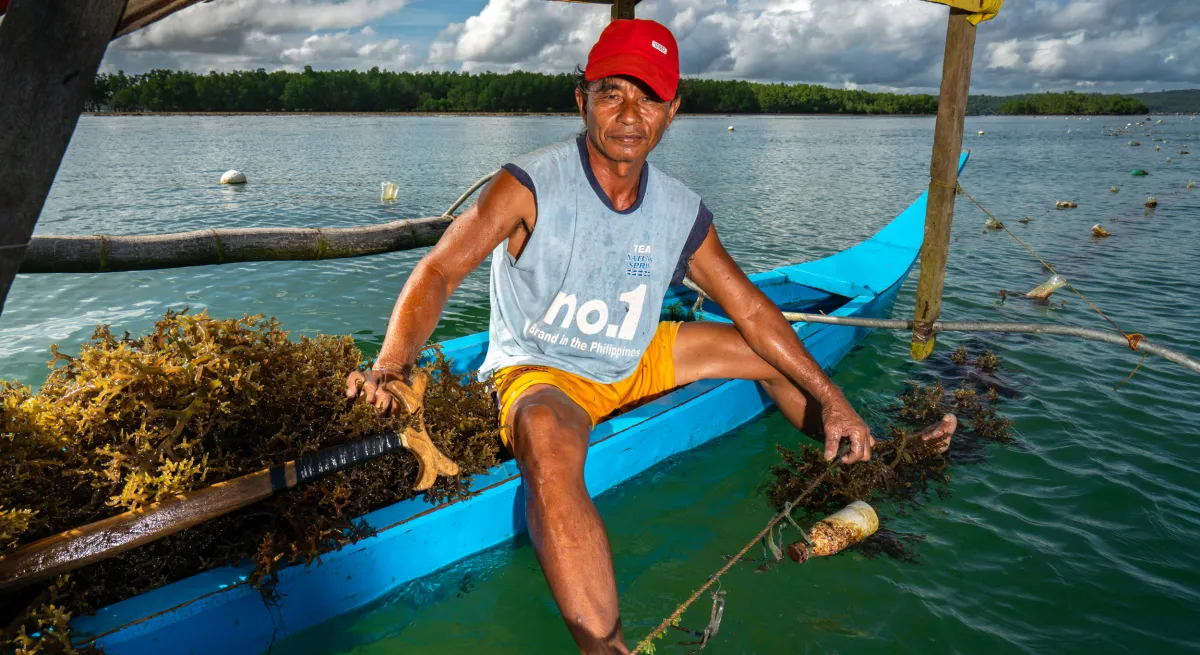
Enabling farmers to develop from having no access to any substantial market to being a vital link within the international seaweed value chain.
8.4180681631512, 126.3340616
In the Philippines, smallholder seaweed farmers lacked the resources to harvest sufficient yield to gain access to the international seaweed market.
The project supported by Julius Baer Foundation and implemented by the Spanish NGO CODESPA connects the farmers in the province of Surigao del Sur with the established seaweed processing company CEAMSA to mutually develop the market for locally grown seaweed by transferring knowledge and technology for higher productivity and establishing exclusive trade agreements. Through the novel collaboration, the smallholders become a relevant part of the seaweed value chain, allowing wealth to flow from the international private sector to the local communities.
Over 800 farmers can now increase their income and wealth while simultaneously providing a basis for their community. They assist other farmers outside the project to improve their livelihood as well.
Quick facts
• Philippines, Province of Surigao, Municipality of Hinatuan
• Project support: 2021-2026
• Grant amount: CHF 110,000 per year
• Linking seaweed smallholders with managers of international processing companies.
From being detached...
Single small-scale seaweed farmers have no means to participate in the global seaweed market, excluding them from any financial capital.
... to market access.
The farmers gain access to the international seaweed market by being organised in an association and in close exchange with the international seaweed processing company CEAMSA to increase their yield.

When we visited the processing plant, I realised how we had to change our way of drying the seaweed for an international industrial process. Without the collaboration with CEAMSA’s managers we would still be selling 6 tonnes of seaweed instead of 13 tonnes at a profit of 10,000 Euro instead of 25,000 Euro total. Indeed, we have doubled the income of each producer.
OUTPUT
The CODESPA project enables over 900 small-scale farmers to act as suppliers in the previously unattainable international seaweed market.
OUTCOME
The farmers collaborate with the established market player CEAMSA, thus accessing expertise and significantly raising their income. In 2024, it increased by 50%.
HIGHLIGHT
Export companies transfer processing technology to the farmers. Signed partnerships and exclusive agreements between the farmers and CEAMSA enable the farmers to grow wealth independently.
Embracing the market’s potential
• When CODESPA approached the Julius Baer Foundation, the seaweed industry in the Philippines was robust.
• However, local producers’ limited resources excluded them from the international seaweed market.
• The (Hinatuan Seaweed Farmers and Fishermen Cooperative (HISFA-CO), founded by the project’s farmers, now meets regularly with the Spanish seaweed company CEAMSA.
• At CEAMSA, the farmers learn how the seaweed is processed for international sales and gain access to established market players’ knowledge and technology.
• Meanwhile, CEAMSA witnesses the lack of technology and process inefficiencies in the fields of Hinatuan. This exchange leads to efficiency improvements via process redesigns and technology.
• Both parties have signed an agreement specifying the HISFA-CO as exclusive suppliers. This gives the farmers access to markets and fair prices.
• In phase two, deeper market access will be crucial. A market study will show how HISFA-CO can access a bigger share of the value chain and diversify its partners.
• Transferring certain processing capabilities to the producers will reduce the wealth inequality gap between HISFA-CO and CEAMSA.



Become a Changemaker

Whether you are an entrepreneur, a scholar, philanthropist or just curious, there are nearly unlimited possibilities to join and play a role in the chain of change.
